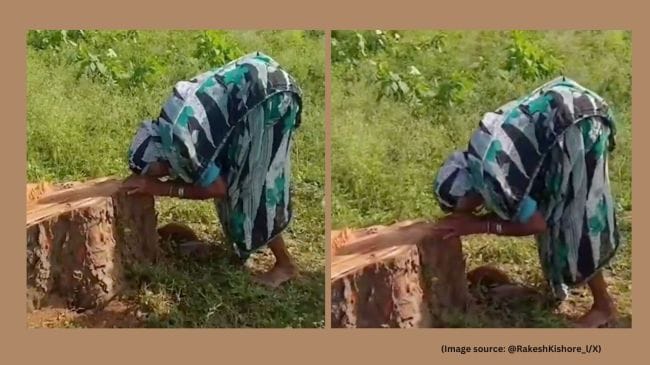Opinion An 85-year old woman, a peepal tree and an unforeseen tragedy
Deola Bai’s tears are a reminder that grief does not recognise boundaries between species
 In the viral video, distressed locals can be seen gathering around the fallen trunk as Deola Bai wept inconsolably (Image source: @RakeshKishore_l/X)
In the viral video, distressed locals can be seen gathering around the fallen trunk as Deola Bai wept inconsolably (Image source: @RakeshKishore_l/X) How do we console the dead? For those who have outlived the departed, there are codes — rituals. A holding of hand, a touch on the shoulder, the grace of an embrace, flowers in one culture, a stock of provisions in another and prayers. But how do we console the dead, the one just gone? The sudden disappearance of life, of breath and sap, from what was alive just a little while ago, feels like an irreversible theft. Nothing one does, no legislation, no inquiry, can undo this stealing. In a Louise Glück poem, the speaker, a bereaved child, writes this to the dead father: “From time to time, I run my hand over your face/ lightly, like a dustcloth”. A dustcloth — how easily dust settles on those who cannot move, furniture and the dead. Dustcloth — how delicate death is. “Against your cheek, my hand is warm/ and full of tenderness.” This is how the poem ends, recording the difference in temperature between life and death, a generically mammalian interpretation.
How do we console the killed, those forced out of life? Death, untimely, an accident, unnatural, turns the familiar foreign. The language for consoling the foreign is unknown to us. What happens when the murdered is of a different species? Our emotional conditioning allows us rituals of remembrance, memorialising and consolation for those of our own species. Similar feelings for other species seem like an indulgence, an unnecessary eighth note. It is as if consolation, too, must have its own genres.
One doesn’t know how to console someone who’s lost a plant. To import the words one uses for the loss of a human would feel like parody, perhaps even sarcasm. There are no rituals — no abstention or withdrawal, no time cycles of purification. There is no officially sanctioned leave, no paperwork. This affection and attachment for a different species is meant to exist on the margins, like trees are in architectural design, pushed near boundary walls as if in an instructive analogy about where our emotions for other species are meant to be.
More than a millennium ago, Deola Bai’s name might have been a peripheral character in the Jataka Tales. But here she was — her age and her action — part of the news cycle. What had this 85-year-old woman done? Nothing criminal. But she had been captured on camera crying inconsolably. The peepal sapling that she had planted about 20 years ago and cared for “like her own child” — as someone in Sara Gondi, her village in Chhattisgarh’s Khairagarh district said — had been cut “for profit”.
I haven’t been able to understand why a sight like that should generate such extremities of responses, between being moved and being bemused. I would imagine that most of us have felt like this at various points in our lives. Whether it was the calamitous felling of thousands of trees for the Siliguri SAARC highway in my hometown or something more personal, like returning home to find a plant that will never respond to air, water and light again, I have found myself breaking down into tears. Inevitably, there’s been someone in the vicinity who’s spouted proof of being a human being: “It’s only a tree…”
Deola Bai “hugging” the tree stump and crying is bound to remind us of the Chipko movement and, by extension, of what has been characterised as an ecofeminist move. But there’s someone else I have found myself going back to — Jagadish Chandra Bose and his tendency to write about plants with feeling, an unexpected thing for a scientist. In an essay about an injured plant, he writes: “The slight reduction in sunlight was not noticeable from inside the room, but the tree sensed it and expressed its melancholy with a small response”. Notice the word “melancholy” he uses for the tree. Is it because we’ve been conditioned to believe that plants don’t have emotions that it becomes hard for many to understand how we can have feelings for them?
“It is by causing injury that we can measure the living index,” Bose writes about plants in his experiments. If we were to import this to the injuries caused by the death of plants on our psyche, I suppose Deola Bai’s “living index” would be higher than what it would be for many of us.
Roy, a poet and writer, is associate professor at Ashoka University. Views are personal






